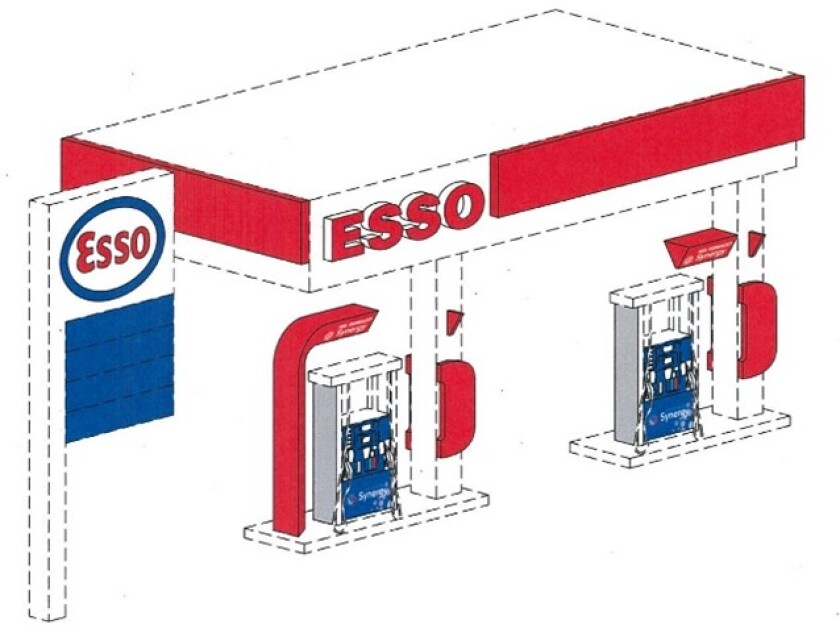In early November 2022, a Thai appeals court overruled the Trademark Registrar’s decision and the Board of Trademarks’ ruling by upholding the registrability of an oil company’s trademark application for its branded service station layout.
This is the latest word in a long-running dispute between ExxonMobil and the country’s Department of Intellectual Property (DIP), which had previously rejected the mark as indistinctive.
ExxonMobil first filed applications in April 2015 for a trademark bearing a unique colourful drawing of the layout of a service station bearing its well-known registered ‘ESSO’ mark in international classes 4 and 35 in Thailand.
However, the Thai Trademark Registrar refused to register the mark, arguing that the mark was devoid of inherent distinctiveness because the service station layout drawing is directly descriptive of the applied-for goods and services related to oil products. According to the Registrar, the public would not be able to distinguish between the goods and services bearing ExxonMobil’s mark and those bearing the marks of others.
ExxonMobil appealed this refusal to the Board of Trademarks, which ultimately agreed that ExxonMobil’s marks are devoid of inherent distinctiveness. The Board explained that the dominant elements in the drawing consist of a common service station with fuel dispensers, which is directly related to the applied-for goods and services related to oil products. The Board also deemed that the submitted evidence was insufficient to prove that the mark had gained distinctiveness through use.
Civil complaint
ExxonMobil disagreed with these rulings and thus filed a civil complaint with the Intellectual Property and International Trade Court (the ‘IP&IT Court’) to revoke the Registrar’s decisions and the Board’s rulings.
The IP&IT Court examined the case and issued its judgment in favour of ExxonMobil, ruling that the marks are inherently distinctive. The court noted that to consider a mark’s distinctiveness, it is crucial to determine the elements that are recognisable and stand out in people’s minds. ExxonMobil’s mark consists of its registered mark ‘ESSO’ being placed in a position and text size that can be readily seen in the layout. Moreover, the mark ‘ESSO’ has been used in Thailand over a long period and has gained public recognition in Thailand and overseas. The court recognised that the ‘ESSO’ mark is recognisable and stands out in people’s minds, and thus it is the dominant element of the mark when considering the mark’s distinctiveness, even though it is smaller in size than the pictured service station and fuel dispensers.
In addition, the court noted that ExxonMobil’s mark is different from other marks because it features other words, such as “fuel technology” and “synergy”, plus an arbitrary placement of colours and shapes as elements of the service station and fuel dispensers. These are also dominant elements to be considered when examining the mark’s distinctiveness because they contribute to the general public’s ability to recognise that the goods and services bearing this mark originate from ExxonMobil.
The DIP appealed the case to the Court of Appeal for Specialized Cases, which agreed that ExxonMobil’s mark is inherently distinctive and registrable under the Thai Trademark Act, because the well-known ‘ESSO’ mark enables the public to understand that the goods bearing this mark originate from ExxonMobil.
However, the court held a differing opinion from the IP&IT Court regarding the service station and fuel dispensers featured in the mark, pointing out that the physical characteristics of these elements are common to service stations and fuel dispensers in general. Therefore, these elements are descriptive and are not subject to exclusive rights, though the mark as a whole remains inherently distinctive.
Comment
In the opinion of Tilleke & Gibbins, these judgments are valid proof that both courts have moved towards taking a more positive judicial perspective of non-traditional trademarks in Thailand. For this case, even though the Court of Appeal for Specialized Cases determined that the physical characteristics of the service station and fuel dispensers featured in the mark are descriptive, it found ExxonMobil’s mark inherently distinctive in its entirety and accepted it for registration.
Overall, the judgment stands as a remarkable development in the acceptance of non-traditional trademarks in Thailand and will likely encourage brand owners to seek trademark protection for new types of marks.












